There’s a growing consensus that to safely scale IoT (the Internet of Things) that blockchain technology must be employed. This is in light of the many device hacks and IoT platform security breaches that continue to expose the vulnerabilities and liabilities of this first phase of IoT implementations (Here are some eye-opening examples).
Over the years, IoT Blockchain companies have evolved. The most recent entrants to this space are demonstrably providing value that IOTA, one of the early players in this space, originally promised but to date hasn't been able to deliver.There are now many alternatives and competitors to IOTA, who are innovating the IoT space. A larger point is that IOTA started an important conversation that more companies have joined; that conversation being that IoT is too important to not be secured on a blockchain.
There are real use cases:
IoTeX - Ucam, Winner of CES award in 2020, the first security camera that lets users protect and manage video footage on a blockchain.
Helium - Airly, indoor air monitoring that runs on Helium’s People’s Network to make air quality data accessible worldwide
Bitcoin SV - VXPass With VXpass and a camera phone, patients can confidently complete the two-dose treatment at different point of care providers.
Who are some of the major players in the IoT Blockchain Space?
IoTeX, Helium and Bitcoin BSV have risen to the occasion to overtake IOTAs in mind and market share. Each brings something else to the table, and will undoubtedly have a major say in the future of the growing IoT blockchain world. Here’s the run-down:
IoTeX As of this August, IoTeX is listed on Coinbase (IOTA and the others featured here are not listed on Coinbase, which is known for its rigorous due diligence required for listing). IoTeX offers a range of pure hardware-oriented solutions including two award-winning devices that are in the open market: a tracking device for B2B and B2C markets and a market-disrupting blockchain security camera. Other offerings include DeFi projects in DEXs, wallets, staking and liquidity pools along with NFT and Play-to-Earn games. Right now there are hundreds of development teams building on IoTeX which employ the same developer skills as those needed for developing on the Ethereum blockchain. Oh, and IoTeX is EVM compatible.
Bitcoin SV’s platform is truer to the original vision of Satoshi Nakamoto. Founded by Calvin Ayre and Craig Wright, Bitcoin SV has made a Bitcoin variant that is more scalable by increasing the block size on their chain. The list of projects on their site include IoT projects, DEXs, wallets, games, crypto token minting, and more. Interestingly, this past summer (2021), Bitcoin SV was the subject of hacks called 51% attacks. where the goal is to take over 51% of the hash rate and use that hashing power majority to control and prevent block production as well as double-spend coins. These attacks were not successful and Bitcoin SV is designed to resist these types of attacks.
Helium is focused on hardware-based IoT projects that include indoor location tracking, air quality monitoring, supply chain, elder care monitoring, micromobility tracking, Hotspots and more (as opposed to applications that support pure IoT projects). They are getting traction in the market with their blockchain based wireless network, The People’s Network. Helium just announced a partnership with DISH Wireless that will significantly expand the number of user-owned wireless network nodes on the Helium Network.
IOTA: What Went Wrong?
IOTA - with a Market Cap of $3.8 Bil. IOTA is still one of the larger players by market cap in the IoT Blockchain industry. Yet, it is a far cry from its peak. This market cap is down from an all-time high of $14.8B in 2017 when investors were more bullish on IOTA’s prospects.
But the shine has lessened as a result of multiple hacks in which money was stolen from users’ wallets, being offline a number of times, the unrealized promise of a fully decentralized platform, the unproven nature of their DAG consensus mechanism, the lack of cross platform compatibility (recent announcements promise IOTA will be EVM compatible), and more. For more information on concerns raised, see this critique. IOTA remains optimistic and recent announcements include plans to be EVM compatible, as their competitor IoTeX already is.
It has to be noted, hacking issues have plagued IOTA. And unlike Bitcoin SV, which successfully resisted attack, in Feb of 2020, IOTA was hacked and went down for over 20 days.
Recently they announced smart contacts, but their competitorsalready had them for years. For example, IoTeX mainnet with smart contracts launched in April 2019, two and half years ago. From its inception, IoTeX has been EVM compatible and able to execute smart contracts. While IOTA just announced recently week with great fanfare that they are planning to add smart contracts “at some point in the future”. The irony is, they positioned themselves as superior to blockchain with Tangle in 2017. And now 4 years later, they are still not far from where they were since it can't even do smart contacts on its own. Why do they even need Tangle? Unclear.
BSV, Helium and IoTeX have been running live blockchain networks since inception. Tangle is still on the Test Net, 4 years and counting. By any measurable metric, IOTA has lost the war. Fanfare aside, in its current state it is a shadow of its former self that continues to scream promise from the house on the side of town. Only diehard IOTA fans seem to be listening.
Verdict: Time to retire IOTA and let the actual IoT blockchaininnovation step in.
Disclaimer: This article is provided for informational purposes only. It is not offered or intended to be used as legal, tax, investment, financial, or other advice
Investment Disclaimer






